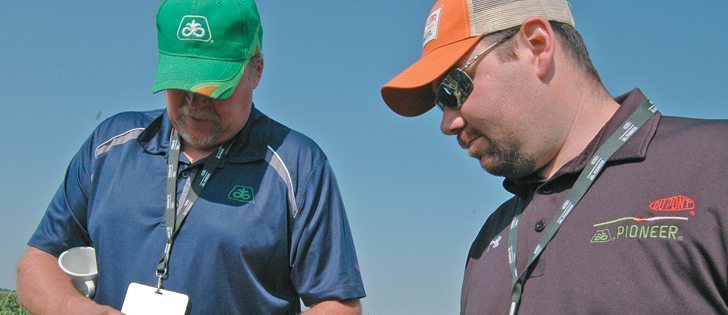Its new research facility looks like a big red barn, but Dupont Pioneer expects to produce a whole lot of green from its Lethbridge site.
Early maturing corn is the focus — corn that requires fewer heat units to reach maturity and can be harvested for grain before fall frost.
“From a development standpoint, we have some 70-day corn that is actually in the market and coming to market,” said Dupont Pioneer Canada president Bryce Eger.
Research at the southern Alberta facility will work toward 68 or 69 day corn so that the crop can be grown across a wider area of Western Canada.
Read Also

Farming Smarter receives financial boost from Alberta government for potato research
Farming Smarter near Lethbridge got a boost to its research equipment, thanks to the Alberta government’s increase in funding for research associations.
“If you take a line that runs from just south of Edmonton across to Saskatoon, that seems to be the geography that is fit to be able to handle that slightly earlier maturing product,” said Eger.
“Today, the corn market of course is basically along the Trans-Canada Highway, but as that corn gets a little bit earlier maturing, we’re able to move it a little bit further north.
“It depends on the usage as well. For silage or for grazing, that of course can move a little bit further north, but for pure grain, and getting it actually to maturity for grain, it’ll need some of those products that are going to be 68 days or so.”
The Lethbridge research facility is adjacent to several acres of corn test plots and is part of a five-year, $35 million investment in western Canadian crop research.
Steven King, evaluation zone lead for the company, said it released three new corn hybrids this year in the 2,000 heat unit range. That is the earliest corn variety ever produced by Dupont Pioneer.
He said those products are Roundup Ready and also include resistance to corn borer, the primary corn pest in this region.
“We want to strengthen that lineup and continue to move that edge earlier and earlier, to get below 2,000 heat units,” said King.
“Once we can do that, then that opens up a lot of corn acres across Western Canada.”
An increase in grain corn production in the West also depends on obtaining more herbicide options for the crop, he added.
“There’s less availability of conventional chemistry in Western Canada than there is in Eastern Canada or the United States because of registrations through the federal government,” he said. “Getting more conventional chemistry options to control weeds in corn in the West is critical so you don’t have to rely on a single herbicide like Roundup.”
King said researchers are well aware that Goss’s wilt has made its way into southern Alberta corn crops, albeit at fairly low levels.
Though yield and maturity are the key selection traits, resistance to Goss’s wilt is third on the list, he said.
The Lethbridge facility will also branch into soybean research in coming years, although King said he does not expect soybeans to be a major crop in the Lethbridge region.
Rather, research here will help develop soybean varieties suitable for north and central Alberta and Saskatchewan.
Dupont Pioneer has a canola production facility a few kilometres away from its new corn facility. It opened the canola plant eight years ago, and Eger said the two operations will give employees more options.
“This complements that very, very well,” he said.
“It allows us to have a wider employee body and also gives us an opportunity to have people move back and forth between different functions in the organization, and from a career standpoint, that’s important as we go forward.”
Trevor Lewington, chief executive officer of Economic Development Lethbridge, said agriculture generates $1 billion worth of business in the city and region, and more than 1,200 companies are focused on or related to agriculture.


















